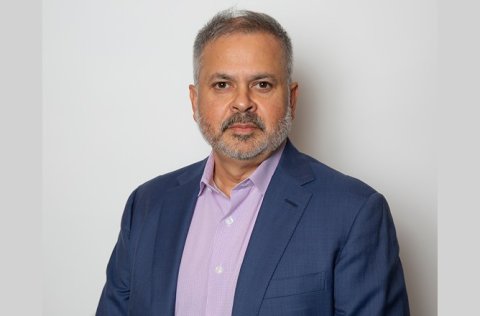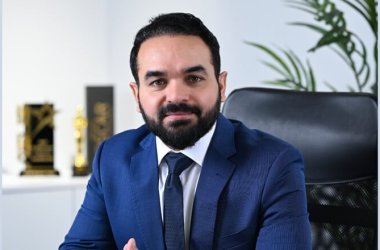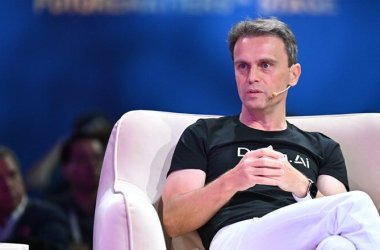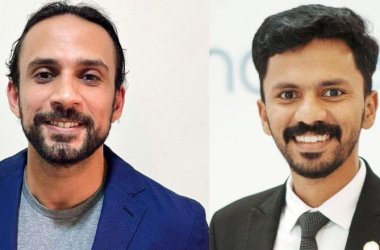Standfirst: CNME Editor Mark Forker sat down for an exclusive interview with Girish Rishi, CEO of Cognite, to learn more about how the company has established itself as a global leader in Industrial AI, the significance of its decision to incorporate a new entity in Abu Dhabi, and ultimately what differentiates Cognite from other players that are in the business of digitally transforming asset-heavy industries on a global scale.

It is fair to say that in the global IT ecosystem, some technology leaders can be guilty of engaging in hubris, declaring that their specific solution, or product is an industry gamechanger.
However, that is an accusation that certainly can’t be labelled at Girish Rishi, CEO of Cognite.
In what has been a hugely successful and decorated career to date, Rishi has demonstrated his ability to deliver time-after-time.
He was a key figure in Symbol Technologies, which was acquired by Motorola, where he was Senior Vice-President for almost a decade, and he was also the CEO of Blue Yonder for 5 years, before its acquisition by Panasonic in 2022.
Girish is now in the box seat at Cognite, where he is driving the company’s rapid growth in multiple markets worldwide.
He began our conversation by providing more detail on the business model that is adopted by Cognite.
Rishi explained that Cognite helps large companies better understand all the data that is generated on the factory floor, and said they were in the business of ‘finding relationships’.
“Factories tend to have data in a multi-modal capacity, such as data, voice, video, images and documents, and what we do is pull all that data in to what we call our industrial knowledge, and that process subsequently leads us to create a knowledge graph. Our objective is to find relationships, and ask questions, such as do you have equipment that was deployed in 2002, how often was it maintained, what components of that model broke down? If you had downtime, and production was completely halted, what was the root cause analysis on that? This is what Cognite does, and we initially started off in the energy space, and then we expanded into utilities and process manufacturing, which is a very large segment for us, and also chemical manufacturing, paper and metal. We are also getting into discrete manufacturing, and most recently we have onboarded customers from pharmaceutical life sciences,” said Rishi.
Rishi described the platform as a ‘marvel’ – and expressed his great pride at the capabilities of the technology that he inherited as leader of Cognite.
“We have a single version, very contemporary product that was built on the cloud and that actually transcends industries within the industrial segment. So, whilst the tech stack is very contemporary, the domain knowledge of industry is key. How is oil pulled from the ground, how is equipment manufactured, how are the factories run, how are the assets maintained, and how do you reduce risk? This is what we do for a living, and we have the creme de la creme of customers worldwide from Houston to Tokyo,” said Rishi.
Traditionally, heavy-asset industries have been slow to adopt and modernise their operations, but there undoubtedly has been a sea-change amongst leaders within the industry over the last 3-5 years.
A recurring theme in terms of customer pain points for Cognite, was that of unstructured data.
“The customers we were working with had structured and unstructured data, and in truth to describe it as being all over the place would be an accurate representation. The primary focus for us was all about access, you have to be able to access the data, and we have something we call extractors. The industry calls them plug-ins, but essentially the extractors allow us to go in to pull documents, pull time series data, and go to programmable logic controllers and pull data in. We have created a library of extractors that allows us to go into factories anywhere in the world, and in a matter of a few days, we are able to pull the data in. At this point, the drawing of the relationships starts to come into play, and that’s where we create the knowledge graph,” said Rishi.
Rishi highlighted how their approach with their library of extractors has completed transformed processes, that traditionally in some cases could last for months.
“Factory managers and people who run operations where spending weeks on certain tasks, and root cause analysis in some instances can take months to resolve. So, tasks they were spending weeks on can now be done in a matter of minutes using our technology. Now, that is transformation and that is transformational. We have huge customers like Aker BP, who are our original customer in Norway. Celanese, who are headquartered in Dallas and Japanese energy company Idemitsu to name just a few, who will be sharing their success stories with us at our user conference in Houston next month,” said Rishi.
Rishi went into more detail on their business model, describing Cognite as a front office on the factory floor tool set.
“Our business model results in forward deployed engineers who come from the industry, so they’ve got that deep industry knowledge. I’d say that in our delivery services team across the company almost half of our people were chemical engineers who have worked on a factory floor, or oil rig. They can go into these refineries and factories and totally understand that environment. We have that acute domain knowledge, and that’s a key differentiator for us,” said Rishi.
Another key differentiator for Cognite is their very hands-on approach with customers, which pales in contrast to the way industrial software providers have previously operated in the past.
“We are incredibly customer-centric. Traditionally, the industrial software space has been served by providers who have built monolithic systems and have told factories that they shall do according to me. Or they have said if you want to it your way, here is the additional money you have to pay, and I’ll customise it for you. That’s the history of factories. Our approach is to come in and say whatever format your data is, alphanumeric, video, documents, we’re not going to say you shall use Google, or Microsoft, or AWS. We run on all three hyper-scalers because we know that today we live in a multi-cloud world,” said Rishi.
Cognite is also giving customers that same choice, autonomy and flexibility when it comes to their Industrial AI and data platform.
“Our AI platform is increasingly seeing great momentum, and I think a key reason for that is we are saying we work with any Large Language Model. So again, we are not coming in and forcing customers to go in a certain direction by saying we will only work on time series data on Microsoft, or Open AI. We’re giving them choice, and at the end of the day it is their platform, we are deploying our people, but they can have as much control on it as they want. They can put their own engineers and developers on it, and that’s our model, and it is one that is resonating greatly with the marketplace,” said Rishi.
The conversation then shifted towards the decision by Cognite to incorporate a new entity in Abu Dhabi.
The sheer volume of investment and size of the megaprojects taking place across the Gulf region is off the scale, but why did Cognite feel that the time was right to establish a base in the Middle East, and why did they choose the UAE?
“We don’t believe customers benefit most with our software if we are sitting in Oslo, or Bangalore, we believe that we have to be on the ground, and that was the magnetic power that pulled us into establishing an entity in Abu Dhabi. We’ve gone from 0 employees into double digits in Abu Dhabi, and the workforce will be doubled again over the next 12 months. We are seeing an incredible demand across the Middle East In the UAE, ADNOC is a customer of ours so we are already engaged with some very significant entities here. We have customers in Qatar, and we also have deployments in both Saudi Arabia and Turkey too, but we just felt that the UAE is so vibrant, and there is so much momentum being driven by the nation’s overall vision for the future. We recognised that we needed to serve our customers in their time zone, in their dock, so we’ve moved additional team members and their families into the UAE to exceed their expectations on our platform,” said Rishi.
We then spoke about the role Agentic AI is going to play in the continued transformation of heavy-asset industries, but again, the CEO of Cognite stressed that no amount of AI will solve your problems if you don’t start by getting your data right.
“The road to AI is paved on a foundation of data. If the foundation of data is compromised, or not coherent, then no amount of data will solve your businesses issues. Our methodology is very much focused on let’s get the data right. Once you have established a great data foundation then operators and people like us that have normal human language questions will ask, what are the first four out of the 200 pumps that I should do preventative maintenance on? Why did I have a shutdown on Tuesday afternoon that was unplanned? What is the history on the Grundfos pump when there are temperature spikes? AI allows us to tap into our data foundation with our AI platform, and in the background it uses different types of LLMs to provide answers that are available and are highly accurate as they are driven by a data foundation, and that is something that couldn’t be done unless you had these monolithic applications,” said Rishi.
Rishi added that he doesn’t subscribe to the negative viewpoint around AI, and said he believes it will empower workers.
“Even going back to three years ago, if we were trying to do what AI is able to do today, then it would take us years to write monolithic application software to get very scripted outputs. AI is enabling the empowerment of the workforce. I firmly reject the rhetoric around AI that we’re seeing. AI needs to be seen as a tool to empower workers, and not replace them. There will be hard hat mobile workers on the factory floor, there will be operators in the control room. At the end of the day, the mission is to empower workers with access to the data that the company already owns,” said Rishi.
The UAE, KSA, Qatar and other Middle Eastern countries are pursuing big, bold and brave economic transformation programs, but rooted in all of these progressive visions are an unwavering commitment to sustainability.
We know that technologies, especially AI are very energy-intensive, so it can be hard to strike the right balance.
However, Rishi said that Cognite was singing off the same hymn sheet as that of H.E. Sultan Ahmed Al-Jaber.
“H.E. Sultan Ahmed Al-Jaber, who is the CEO of ADNOC, and Minister for Energy in the UAE, has sort of emerged as the de-facto leader of the energy industry, and what he says highly resonates with what we believe at Cognite, in relation to the fact that it’s not about one mode of energy. It’s about all modes of energy. It’s about Oil and Gas, Nuclear, Wind and Solar. It has to be about all modes of energy considering the demands of 8 billion people in the world, and especially in a world that is going to become increasingly driven by datacentres. In the Middle East, they are very sensitive to the climate, and are focused on doing things in a sustainable and responsible manner. We’re seeing a very high threshold, and that’s why industrial software is not easy. It is very complex, but they desperately want to meet their sustainability goals, but they are also going across all streams of energy production, that we are engaged with, with our customers, so it is complex, but they can certainly achieve their sustainability goals,” said Rishi.
Rishi concluded a brilliant conversation by summarising what he believed differentiates Cognite from other market players.
“The duopoly of a modern, resilient tech stack coupled with industrial domain is our secret sauce. If we overdo the contemporary tech stack and become a Silicon Valley software company only, then we lose our domain knowledge, and that’s no good. If we become a legacy domain player, then that’s also no good. So, we have that secret sauce of duopoly, and that is what I believe ultimately differentiates us from the big sharks who we are swimming the high seas with,” said Rishi.





